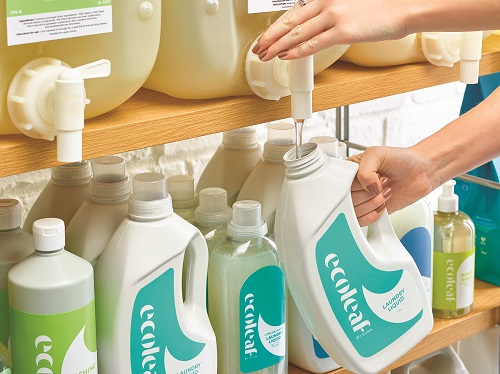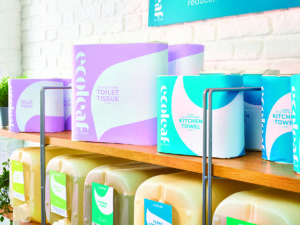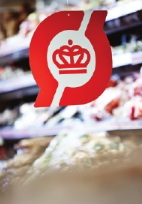Posted by admin on March 24, 2020 · Leave a Comment

Friends of the Earth has described news that Sainsbury’s plans to become net zero by 2040 as encouraging.
The supermarket giant announced that its business and operations will become net zero in line with the goal to limit global warming to 1.5 degrees, the highest ambition of the Paris Agreement. It will focus on reducing carbon emissions, food waste, plastic packaging, water usage and increasing recycling, biodiversity and healthy and sustainable eating. In its statement, Sainsbury’s added that it will work collaboratively with suppliers and ask for their own carbon reduction commitments. It says it has committed to investing £1bn over 20 years towards becoming a net zero business across its own operations by 2040, aligned to the highest ambitions of the Paris Climate Change Agreement and a decade ahead of the UK Government’s own target. The retailer will work with the Carbon Trust to assess emissions and set science-based targets for reduction, publicly reporting on progress every six months.
Mike Coupe, CEO of Sainsbury’s, commented: “We have over 27m customers each week and almost 180,000 colleagues and we hope that we can collaborate across industries and sectors to help create momentum and drive meaningful change. Only when the trajectory for global warming slows to a maximum of 1.5 degrees will we all know that we can truly live well for less now and in the future.” Commenting on the news, Friends of the Earth’s Head of Policy, Mike Childs, commented: “It’s encouraging to see Sainsbury’s stepping up to the plate on the climate emergency – the rapid transition to a net zero economy is urgently required. Supermarkets have a huge influence on our personal carbon footprints, so the more they can do to embrace and encourage greener lifestyles, the better for us all. Encouraging and supporting the switch to a more plant-based diet is particularly important – eating less, but better quality, meat and dairy would be healthier for people and the planet.”
He continued: “The influence supermarket chains have over suppliers is also huge – they must use that to encourage better environmental standards while ensuring a fair deal for farmers.”
Posted by admin on March 18, 2020 · Leave a Comment

Ecoleaf by Suma has undergone a makeover to now boast a cleaner look and greener packaging.
The leading supplier of vegetarian and sustainable products has announced that the range’s bottles will now be made of post-consumer recycled packaging (PCR) – plastic that has previously been used in a product that is then reprocessed and remade into something new. Products made from post-consumer plastic close the loop, diverting plastic from landfill and allowing it to be recycled into something else.
Ecoleaf’s paper products will be wrapped in paper, which is 100 per cent recyclable, and offers an alternative to brands which wrap their toilet and kitchen rolls in plastic. The outer packaging will also be 100 per cent home copostable.
All Ecoleaf by Suma cleaning products are made in the UK, vegan and never tested on animals, plant-based, biodegradable and made using non-hazardous ingredients.
Posted by admin on March 7, 2020 · Leave a Comment

Mooncup has announced its reusable menstrual cup is being available free of charge to pupils of all state schools and colleges in England as part of a new Department for Education scheme.
The move marks the first time that environmentally-friendly and plastic free products are being offered as a free option in schools in England, alongside traditional disposable pads and tampons.
Kath Clements, Company Director of Mooncup, commented: “We are excited to be working with phs and the Department for Education to provide sustainable period products to young people across England. Based on our experience of working with the sexual health and wellbeing charity, Brook, we know that young people find the cost-effectiveness of menstrual cups particularly appealing, as well as their convenience and low environmental impact.
“Our goal from day one has been to make menstruation as positive an experience as it can possibly be. We hope that this initiative, and the conversation around it, will help in continuing to break the taboo around periods, as well as giving young people access to information about all their menstrual product options.”
Posted by admin on March 1, 2020 · Leave a Comment

A Government Minister has emphasised the importance of the Welsh’ food and drink industry prospering post-Brexit following a record year.
The latest industry figures reveal record-breaking turnover of £7.473bn in Wales in 2019, surpassing the ambitious target set in 2014 to achieve 30 per cent growth and reach £7bn of sales by 2020.
And with the UK having now left the EU, Lesley Griffiths, the Minister for Environment, Energy and Rural Affairs, recently visited ZERO2FIVE Food Industry Centre, at Cardiff Metropolitan University, where she spoke of her hopes for the future of the sector in a post-EU world.
“In 2014, we announced a simple and bold target – to raise the industry’s sales value by 30 per cent to £7bn by 2020. I am absolutely delighted we have now more than achieved this, the latest data showing the sector has a value of £7.473bn,” she commented.
“Wales’ food and drink industry has never been in ruder health and it has been fantastic to share the success with some of our wonderful, innovative producers here today.” However, describing Brexit as a big disruptor, she continued: “I am in regular contact with Ministerial counterparts in the UK Government and my message to them is clear. This sector is a real success story which we need to continue to promote and develop; it should not be overlooked or sold down the river. During trade negotiations and discussions on our future relationship with the EU, the UK Government must consider the impact on the 23,000 people who work in Wales’ food and drink sector and the 217,000 employed in the wider supply chain.”
Posted by admin on February 26, 2020 · Leave a Comment

This year marks 30 years of the Danish organic logo and is being marked with a special celebration.
Denmark is considered a world leader when it comes to the share of the total food market held by organic products and is represented with the national Danish organic logo – the red Ø – which is 30-years-old in 2020. 
Prior to this logo being established, the Danish Parliament had passed the world’s first law on organic production, and since then, the Danish Government has certified and controlled the country’s organic farmers and companies. Today, 98 per cent of the Danish population are aware that the red Ø is the Danish Government’s guarantee for the organic production of natural foods with focus on clean environment and a high level of animal welfare.
Each time a Dane buys food and drink for 100 kroner (the Danish currency), almost 14 kroner of that is spent on goods that bear the red Ø and the EU’s green organic logo. Based on increasing sales over previous years, Organic Denmark estimates that during 2020, the average Dane will spend 3,400 kroner, equivalent to 453 Euros, on organic products.
“There’s no doubt that the red Ø and the general cooperation between successive Danish consumers have a lot of confidence in the way in which products are controlled all the way from the farmer to the supermarket, and the label has a high level of credibility,” commented Pernille Bundgard, International Market Director at Organic Denmark.


 Organic & Natural Business magazine
Organic & Natural Business magazine






